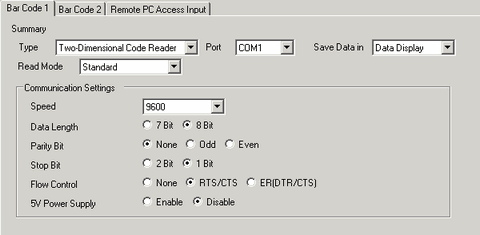Port
Select the port to connect: [USB/SIO(RS232C)], [USB], or a serial port such as [COM1].
![]()
-
When using one of the following models, you cannot select [USB/SIO (RS232C)].
-
IPC Series
-
SP5000 Series Open Box
-
LT4000 Series
-
When using one of the following models, you cannot select [USB].
-
IPC Series
-
SP5000 Series Open Box
Serial port, such as COM1, USB/SIO(RS232C)
Select when connecting to the USB/SIO(RS232C) port or a serial port, such as COM1.
![]()
-
When [USB] is selected, set up items for [Communication Settings] will not be displayed.

Speed
Select a communication speed from [2400], [4800], [9600], [19200], [38400], [57600] or [115200].
Data Length
Choose the communication data length from [7 bit] or [8 bit].
Parity
Select the communication parity bit: [Even], [Odd] or [None].
Stop Bit
Choose the communication stop bit length: [1 bit] or [2 bit].
Flow Control
Select the communication control method: [None], [RTS/CTS Control], or [ER(DTR/CTS) Control].
If you selected [USB/SIO(RS232C] for the [Port], this property is fixed to [None].
5V Power Supply
Designate whether or not to set the 5V power supply.
If you selected [USB/SIO(RS232C] for the [Port], [Disable] is selected automatically.
Read Mode
Select the read mode.
-
Standard

In [Standard] mode, binary data cannot be handled. In this mode, two-dimensional code readers from other manufacturers can read data using the above setting.
-
QR Code Reader manufactured by DENSO WAVE INCORPORATED

[DENSO] mode can handle binary data. But in this case, the above communication format needs to be set to a two-dimensional code reader as well.
-
Code Reader manufactured by TOHKEN CO., LTD.

In [Tohken] mode, the above communication format must also be set to a two-dimensional code reader. Binary data cannot be handled in [Tohken] mode. Unlike code readers manufactured by DENSO WAVE INCORPORATED, the code reader does not check the number of digits or BBC and determines that the code data ends at the CR+LF code in the code data.
![]()
-
When [Port] is "USB" and [Type] is "Two-dimensional Code Reader", only" Standard" Read Mode can be set.